Mellow Yellow Cold Pressed Rapeseed Oil is a fantastically healthy choice for your cooking oil, so we know that lots of people choose our products when they are following various diets, for example, Weight Watchers, Slimming World, the 5:2 diet and many others.
In order to make it as simple as possible for those following these diets, we have worked out the nutritional information for the full Mellow Yellow range depending on the diet you’re following. If you would any other nutritional information about our range of products, please get in touch with us on info@farrington-oils.co.uk.
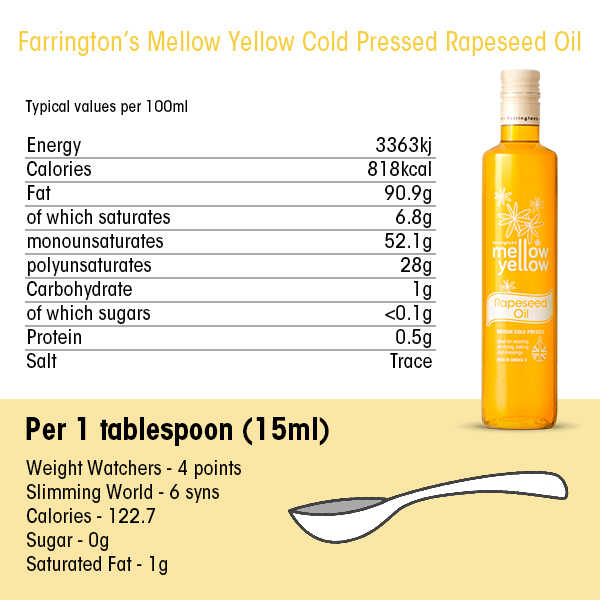
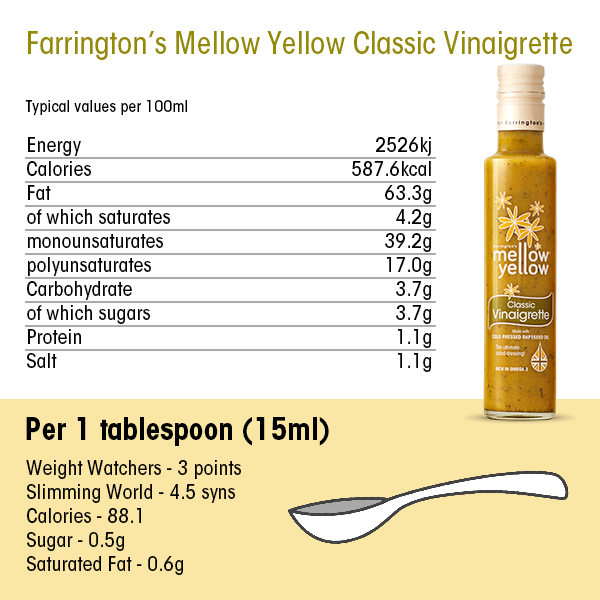
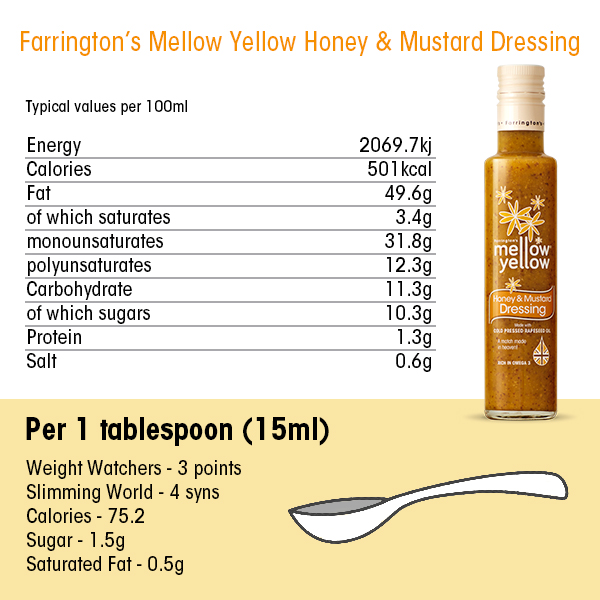
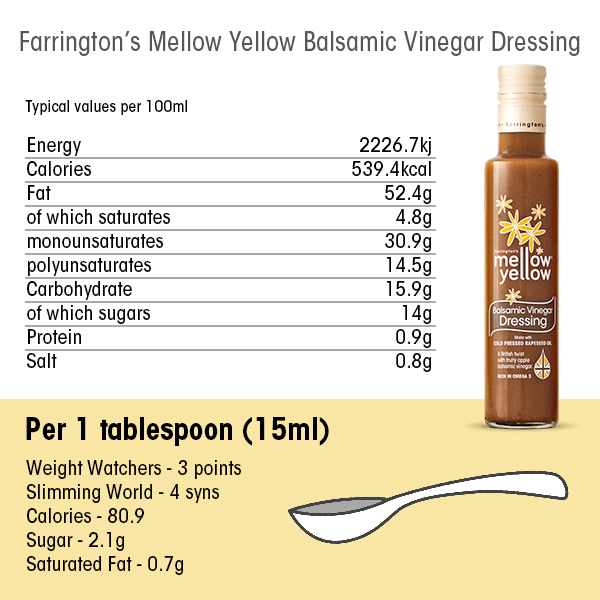
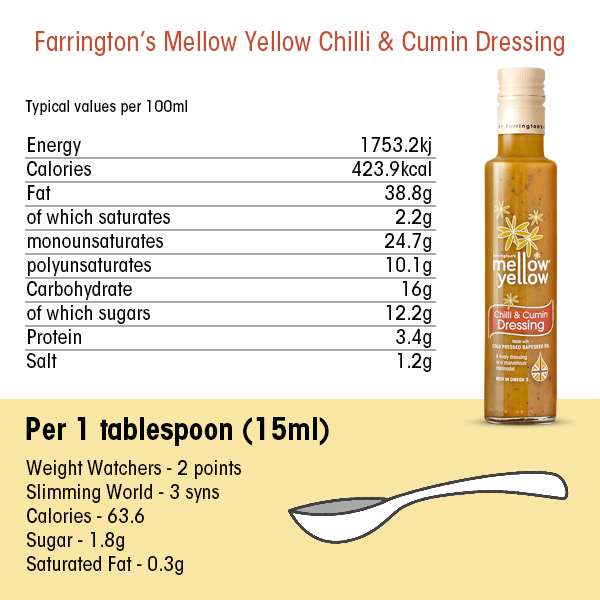
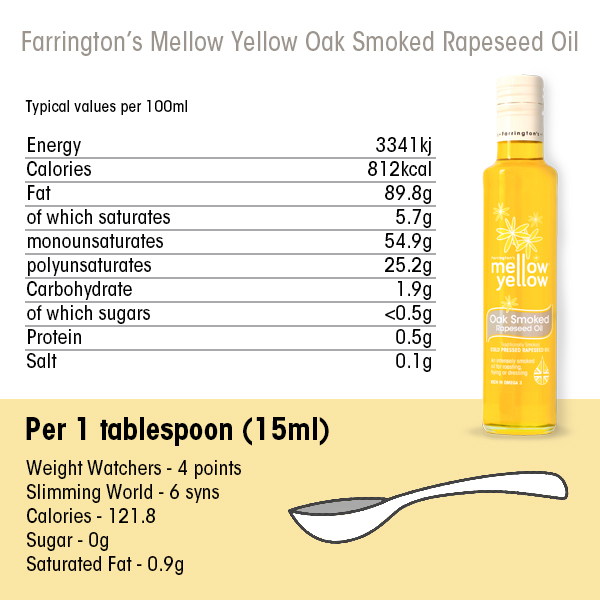
If you would like to learn more about the nutritional properties of Mellow Yellow Rapeseed Oil, we have a number of articles written by The British Nutrition Foundation:
– Introduction to Healthy Fats
– Comparison of Different Culinary Oils
Can you cook with cold pressed rapeseed oil? We get asked this question quite a lot, and the answer is simply YES. There is a lot of information about how some oils are only for drizzling or cooking at low temperatures and that some oils are meant for high temperature cooking, so let us explain the differences between the oils and what makes them suitable for high temperature cooking.
The way to tell if an oil is suitable for cooking with is to look at its smoke point. Smoke point is the temperature at which oil can be heated to before it starts to produce smoke. Once an oil goes above its smoke point, other than the unpleasant smoke that is created, the oil itself also starts to breakdown and the nutritional composition changes.
Different oils have different smoke points, below shows the smoke point of common cooking oils. This is a great way for you to choose the oil that you need for your cooking and which oil you may want for other uses, such as drizzling.

Smoke points of common cooking oils
Cold Pressed Rapeseed Oil – 230°C
Sunflower Oil – 225°C
Extra Virgin Olive Oil – 190°C
Coconut Oil – 175°C
Butter – 120°C-150°C

Typically, when roasting in an oven, your oil will get up to 180°C, so for roasting you need to ensure you choose an oil with a smoke point above this. For pan frying, you may reach up to 220°C and deep frying is typically around 180°C.
When choosing a cooking oil, you need to ensure that the smoke point is suitable for what you want to use it for. As well as smoke point, nutritional composition and flavour are also very important.

Farrington’s Mellow Yellow Cold Pressed Rapeseed Oil is an ideal all-round cooking oil. With a high smoke point of 230°C, you know that you can use it for all types of cooking. As well as the smoke point, our cold pressed rapeseed oil also has a lovely subtle, nutty flavour, which means it great for cooking all sorts of delicate ingredients such as fish and also adds a lovely nutty flavour when used a drizzle or pouring oil. In terms of nutrition, cold pressed rapeseed oil has half the saturated fat of olive oil and ten times less than coconut oil, it has the correct balance of Omega 3, 6 and 9 which is good for your health and it also contains Vitamin E and Vitamin K. For more information about the health benefits of cold pressed rapeseed oil, read our blog post here.

Delicious recipes to cook with cold pressed rapeseed oil
Now you know that you can cook with cold pressed rapeseed oil, here are our some of our favourite recipes to cook with cold pressed rapeseed oil that take advantage of the versatility of this brilliant oil…
Roast potatoes
By using Mellow Yellow Cold Pressed Rapeseed Oil, you can create a beautifully crunchy coating with a light and fluffy centre. Follow our Roast Potato recipe here.
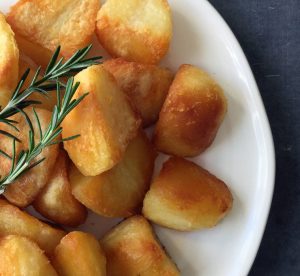
Stir Fry
Drizzle your oil into a hot wok and enjoy cooking a stir fry without creating lots of smoke. Find our Vegetable Stir Fry and Dipping Sauce recipe here.
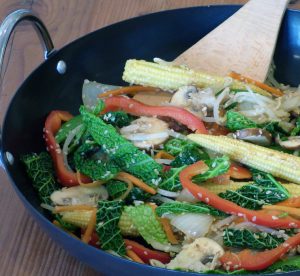
Crispy Baked Chicken Goujons
Mixed with panko breadcrumbs, the oil on the outside of these goujons gets super crispy in the oven without needing to deep fry! Find the recipe here.
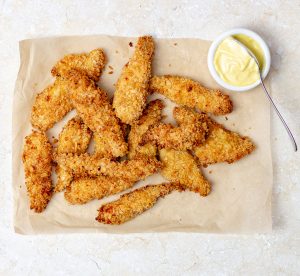
Raspberry & White Chocolate Granola Bars
The subtle, nutty flavour of cold pressed rapeseed oil is perfect in these simple and delicious granola bars. Recipe here.
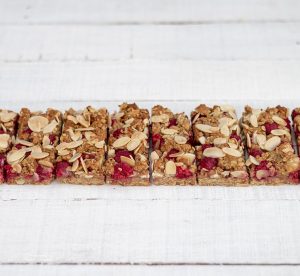
For more recipes, visit our Recipe page.
To find stockists of our Mellow Yellow Cold Pressed Rapeseed Oil, visit our Where to Buy page.
“Salads are good for us.”
Everyone agrees with this statement as we are encouraged to eat five portions of fruit and vegetables, including salads, every day. Salads provide an essential source of vitamins, minerals, anti-oxidants and fibre, as well as being a delicious meal or accompaniment to meals. So why are we telling you to never eat a salad naked?
As people become more aware of healthy diets, the desire for low fat, low sugar or low salt meals and ingredients increases. This is especially so with oils, mayonnaises and salad dressings as ‘low fat’ or single calorie sprays become increasingly popular. At Farrington’s Mellow Yellow we often speak to customers who are keen to eat a healthy low-fat diet, to the extent that they don’t like to put salad dressings or mayonnaise on their salad with the aim of reducing their fat intake. The logic and ambition may be good, but a quest to reduce calorie intake by eating a salad un-dressed actually deprives people of the fantastic health promoting nutrition locked up in the salad. Not only is a fat required to absorb the nutrition within a salad, dressing a salad makes it more interesting and delicious to eat, helping you to make it a regular and enjoyable part of your diet. Also consideration should be given to the choice of fat used, but more on that later.
Salads are a wonderful source of vitamins and carotenoids. Vitamins play vital roles in health and body metabolism, along with their interaction with minerals required in the diet. We need to take vitamins in small regular amounts in our diet as the body can not store them and they can even be harmful if taken in excess. Vitamins are either fat soluble or water soluble, with Vitamins A, D, E and K being fat soluble. Salads contain fat soluble vitamins, so unless a salad is dressed with an oil-based dressing or mayonnaise, it is very difficult for the body to absorb these vitamins. By eating a healthy, balanced diet, there is no need for vitamin supplements to be taken.
Carotenoids are the naturally-occurring pigments in foods, with fruits and vegetables providing most of the carotenoids in the human diet. They play important roles in the body as powerful anti-oxidants; from the prevention of various types of cancers and chronic heart disease, to the maintenance of healthy eyesight. Carrots, known to help us see in the dark, get their orange colour from Alpha and Beta-Carotene. While the yellow colour of Mellow Yellow Cold Pressed Rapeseed Oil comes from carotenoids called Luteins, containing around five times more than in extra virgin olive oil.*
Carotenoids are fat-soluble compounds so, just like the fat-soluble vitamins, to get the best nutritional benefit from colourful salad ingredients such as peppers, carrots, spinach and tomatoes, dress your salad with a fat to allow your body to absorb the carotenoids. However, research has shown that the type of fat eaten also affects how well we can absorb carotenoids from food. For example, a salad dressing made with an oil rich in mono-unsaturated fats, such as cold pressed rapeseed oil, absorbs more carotenoids compared to a dressing made with oils rich in saturated or poly-unsaturated fats, such as soybean, palm, sunflower or coconut oils for example. So not only should you ensure your salad is dressed with a fat, you should try to ensure the fat is rich in mono-unsaturates.
![]()
Why you should never eat a salad naked:
– Adding fat to salad allows your body to process the fat-soluble vitamins
– Using an oil rich in mono-unsaturated, such as cold pressed rapeseed oil, helps the body absorb anti-oxidant caratonoids
– Adding flavour helps motivate you to eat healthy salads regularly by making them more enjoyable
![]()
So, whether you are a purest and enjoy your salad simply drizzled with oil, like to pimp up a lettuce leaf creatively with a salad dressing, or if you prefer an indulgent dollop of mayonnaise; remember never eat a salad naked. The best dressed salads not only taste better, but make their nutritional delights all the more enjoyable. And just pause to think if a single calorie spray oil, a low fat salad dressing or mayonnaise really is as healthy as you first thought? Not to mention what actually goes into making some of those so-called healthy options…
But as far as the clothing you chose to wear, or not, while enjoying your favourite salad, we’ll leave that up to you.
![]()
* Crude rapeseed oil contains up to 95 mg/kg carotenoids, comprising about 85-90% luteins and 7-10% as carotene (Gunstone 2004). Extra virgin olive oil also contains luteins and carotene, but at levels of up to 20mg/kg only (Bosku, 2009) i.e., it only contains around one fifth the carotenoid antioxidant properties of rapeseed oil.
Bosku D., (2009). Olive oil Minor Constituents and Health CRC press p52.
Gunstone F D., (2004). Rapeseed and Canola Oil; Productrion, Processing, Properties and Uses, Blackwell Publishing
Cooking oils are a type of fat. Fat is a macronutrient (like protein and carbohydrate) that is made up of fatty acids. With so many different cooking oils available, most people don’t know which oil they should be using in their cooking for the healthiest results and often ask us what is the healthiest oil to cook with . This article will help to explain the different factors you should consider when choosing which oil to cook with.
What should we consider when looking at what is the healthiest oil to cook with?
When trying to decide which oil to cook with, we need to look at the following things. (We’ll explain each one a bit later on!)
– Saturated fat
– Unsaturated fat
– Trans fat
– Omega 3, 6 and 9
– Smoke point
– Vitamins and minerals found in the oil
What is fat?
Fat is a macronutrient (like protein and carbohydrate) and is made up of fatty acids. These fatty acids can be classified as saturated or unsaturated depending on their chemical structure. Unsaturated fatty acids include monounsaturated fatty acids and polyunsaturated fatty acids.
All fats provide 9 calories (kcal) per gram, regardless of the levels of saturated and unsaturated fatty acids, the big difference is the effect these fats have on your cholesterol levels so we need to ensure that we eat the healthiest fat we can.
Fat is a good source of energy and we need some fat in our diet to help us absorb the fat soluble vitamins A, D, E and K.
Within the body, fatty acids form part of our cell membranes and fat also helps to insulate and protect our internal organs, contributing towards maintaining our body temperature and is involved in lots of body processes such as the development of our brains and the communications which occur between different cells. Cholesterol is needed to produce bile acids, which help us to digest food, and also some of our hormones.
What is Saturated Fat?
Saturated fat is found in foods such as fatty meats, hard cheese and butter.
High intakes of saturated fat have been shown to raise levels of ‘bad’ (LDL – Low Density Lipoproteins) cholesterol in the blood. High blood cholesterol increases the risk of developing heart disease and stroke by building up in our arteries, causing them to narrow. It is best to eat foods that contain less saturated fat.
An easy way to tell if your oil contains high levels of saturated fat is whether it is solid at room temperature, if it is, it most likely contains a high amount of saturated fat.
Chemically speaking, saturated fats have don’t have any double bonds between their carbon atoms in the fatty acid chain.
What is Unsaturated Fat?
Often called ‘good fat’, unsaturated fat help to maintain a healthy cholesterol level and have even been known to help lower levels of harmful cholesterol. Unsaturated fats are either monounsaturated or polyunsaturated.
Our bodies are able to make most of the specific fatty acids we need apart from two polyunsaturated fatty acids which we must get from our diet. These two fatty acids are alpha linolenic acid (an omega 3 polyunsaturated fatty acid) and linoleic acid (an omega 6 polyunsaturated fatty acid). Our bodies need these for brain development, growth and for a healthy immune system.
Omega 3 and 6 are called essential fatty acids as we need to obtain small amounts of them from our diet. Alpha linolenic acid is found in rapeseed, walnut and soya oils and spreads made from these. Linoleic is also found in plant based oils such as sunflower, corn, peanut, rapeseed, olive, safflower, sesame, walnut and soya oil and spreads made from these. Both of the essential fatty acids are present in smaller amounts in foods such as meat, eggs and oily fish. Ideally our bodies need Omega 3 and Omega 6 in the right balance of one part Omega 3 to every two parts Omega 6.
What about Trans Fat?
These are the worst types of fat and should be avoided wherever possible as they have been known to increase blood cholesterol levels. Typically, foods with hydrogenated oils likely contain trans fats, such as fried foods, takeaways and hard margarines.
As you can see, the levels of saturated and unsaturated fat in your cooking oil is very important. We have broken down the most common oils in the simple table below for you.
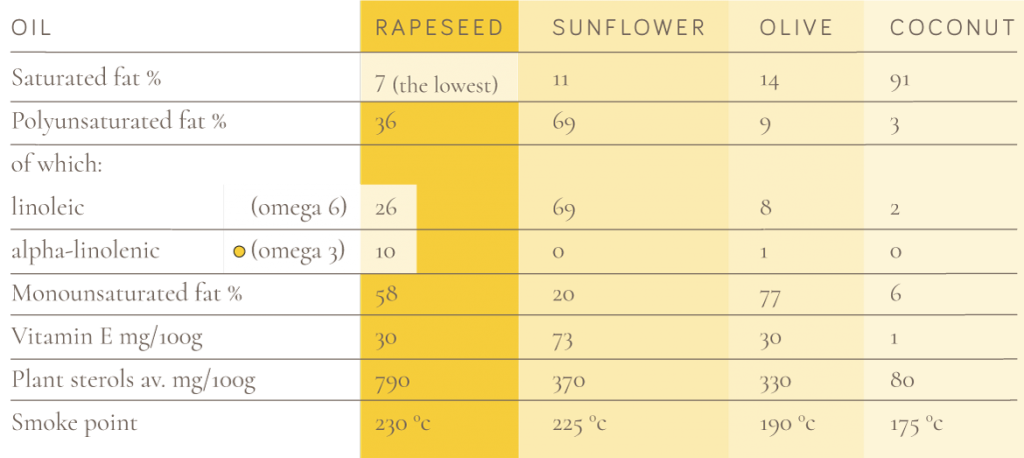
* Ideal balance of Omega 3 to Omega 6.
Does Smoke Point matter?
Other than the levels of different fats in your oil, if you are cooking with oil, you need to ensure that the smoke point is suitable. It can be dangerous to take an oil over its smoke point as this can cause the chemical structure to break down, which is why we always recommend cold pressed rapeseed oil for high temperature cooking as it has a smoke point of 230°C.
Are Vitamins and minerals found in oil?
Some oils, especially those that are cold pressed, can contain naturally occurring vitamins and minerals. Plant sterols can also be found in some oils, learn more about these in our blog post.
Cold pressed rapeseed oil contains vitamin E, vitamin K and catotenoids including provitamin A. Vitamin E is an important antioxidant and vitamin K is needed for efficient blood clotting. Provitamin A is essential for healthy skin, eyesight, growth and reproduction and, carotenoids contain luteins which are an antioxidant and give the oil its distinctive yellow colour.
So what is the healthiest oil to cook with?
We want an oil with low saturated fat, high unsaturated fat (including both polyunsaturated and monounsaturated), a high smoke point and containing as many other vitamins and minerals as possible.
The obvious choice has to be cold pressed rapeseed oil (but we would say that, wouldn’t we!) From the table, we can see that cold pressed rapeseed oil has the lowest saturated fat levels, a good balance of both types of unsaturated fat, a high smoke point and also contains vitamin E and plant sterols.

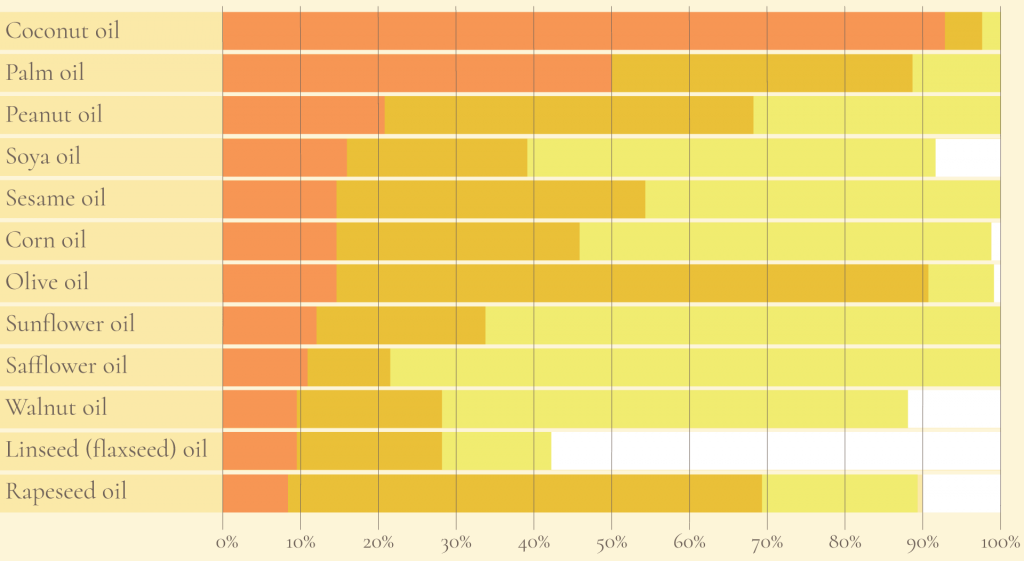
All oils contain a mixture of unsaturated fat and saturated fat and the healthiest ones to use are those with the lowest saturated fat and highest unsaturated fat.
So, if you’re asked what is the healthiest oil to cook with, you now know that you want an oil with a low saturated fat content and high in unsaturated fat. Cold pressed rapeseed oil is ideal, find out more here and find stockists here.
Did you know that cold pressed rapeseed oil is a great, heart-happy oil? Are you looking to improve your health? Well we have one simple change for you that will help you with this goal. Mellow Yellow Cold Pressed Rapeseed Oil is a brilliantly healthy, British cooking oil that is grown, pressed and bottled in Northamptonshire. Read on to find out more about all the fantastic health benefits of cold pressed rapeseed oil…
Top 4 Health Benefits of Cold Pressed Rapeseed Oil
Low saturated fat
A balance of Omega 3 and Omega 6
Contains Vitamin E
Naturally occurring plant sterols
Low saturated fat
Saturated fat is usually found in high levels in fatty meats, full fat dairy products, coconut oil and lard. For many years, health professionals have advised against consuming high amounts of saturated fat as they have been shown to raise your LDL (Low Density Lipoprotein) levels. LDL is known as ‘bad’ cholesterol as high levels of LDL blood cholesterol increases the risk of heart disease by building up in our arteries and causing them to narrow. Cold pressed rapeseed oil, however, has very low levels of saturated fat. This is one of the major health benefits of cold pressed rapeseed oil! For more information from the British Heart Foundation, click here.
A balance of Omega 3 & Omega 6
Mellow Yellow Cold Pressed Rapeseed Oil contains both Omega 3 and Omega 6. These are essential fatty acids that the body is unable to produce itself so we need to ensure that we consume these in our diet. These two essential fatty acids contribute to brain development, growth and maintaining a healthy immune system. It is important that we consume these two fatty acids in the correct ratio as found in cold pressed rapeseed oil. It is this ratio that makes this one of our top health benefits of cold pressed rapeseed oil. We have more information on Omega 3 and 6 on our Health and Nutrition page.
Contains Vitamin E
Another of the health benefits of cold pressed rapeseed oil is that it contains vitamin E. Vitamin E occurs naturally in cold pressed rapeseed oil and is needed for a strong immune system and healthy eyes and skin.
Naturally occurring plant sterols
Last but not least in our top health benefits of cold pressed rapeseed oil are the naturally occurring plant sterols found in this brilliant oil. Plant sterols are fat-soluble compounds found in some vegetables, nuts and seeds, including rapeseed. They are similar in structure to cholesterol therefore when eaten, plant sterols compete with cholesterol for absorption into the bloodstream. Our bodies find it easier to absorb plant sterols as they block the cholesterol from being absorbed. This results in the cholesterol passing through and out of the body via the stool. Find more information here.
Comparison of oils:
With these brilliant health benefits of cold pressed rapeseed oil, it’s easy to see why so many people are swapping to Mellow Yellow Rapeseed Oil! Find out where to buy here.
If you want to know more about cold pressed rapeseed oil, how we produce it, how it grows, the simple way we press the seeds to produce our cold pressed rapeseed oil and more on what is so special about cold pressed rapeseed oil, have a look at this article!
For recipe inspiration on what to cook with cold pressed rapeseed oil, visit our Recipe page here.
Weight gain and obesity are a twenty-first-century health issue. With all of this temptation surrounding us, it’s easy to go up a dress size without even noticing it. However, by adopting these simple healthier lifestyle steps shared with us from the British Nutrition Foundation into your daily regime, alongside a careful exercise programme, you can drastically reduce the extra weight you’ve been carrying.
How can I maintain a healthy body weight?
Being overweight increases the risk of chronic diseases such as heart disease, type 2 diabetes and some cancers. In order to maintain a healthy body weight, it is necessary to consume roughly the same amount of energy (calories) as your body uses for normal bodily functions and physical activity. Reducing fat intake can often help cut back on calories but it is also important to reduce your amount of ‘free sugars.’ ‘Free sugars’ are added to foods by manufacturers, cooks and consumers (such as table sugar) as well as sugars naturally present in honey, syrups and fruit juice. It’s worth noting that sugars found in fruits and vegetables and in milk and milk products such as plain yoghurt and cheese are not classed as free sugars. Foods that are often high in fat and/or free sugars include cakes, biscuits, pastries, desserts, deep fried foods, crisps, butter, cream, chocolate, sweets, some cheeses and oils/spreads, so try to eat these foods less often.
Remember the following when selecting and preparing food to help reduce your daily calorie intake and aim to consume a healthy, balanced diet:
- Base meals on starchy foods, whole grain and high fibre versions where possible, such as wholemeal bread, wholemeal pasta, brown rice and potatoes with skins and plenty of fruits and vegetables
- Remove visible fat from meat, skin from poultry, buy lean cuts wherever possible and try replacing some meat in your diet with pulses
- Grill, bake, poach or steam foods instead of frying or roasting them
- Choose low-fat, unsweetened dairy products (e.g. skimmed or semi-skimmed milk, reduced-fat cheese and low-fat plain yoghurt)
- Use reduced fat spreads where possible and opt for those high in unsaturated fats, see our article Make Sure You Eat the Good Fats for more information on this
- Choose tomato-based rather than creamy sauces
- Cook from scratch wherever possible
- Opt for low-calorie drinks such as unsweetened tea and coffee or plain water rather than sugars-sweetened options
- Limit fruit juice to 150ml per day. Try diluting it with water to make it go further.
- If you are hungry between meals, snack on fresh fruit and vegetables rather than foods high in fat and/or free sugar
- Eat more fibre – adults should be aiming to consume 30 g fibre per day to reduce the risk of chronic diseases such as heart disease, type 2 diabetes and colon cancer. Fibre-rich foods include wholegrain foods, potatoes with skins, fruit and vegetables, pulses, nuts and seeds.
Eli Farrington reveals what you might not know about this underused British ingredient
1. A truly versatile all-purpose culinary oil; cold pressed rapeseed oil contains the optimum ratio of 1:2 of omega 3 to omega 6, as well as being a natural source of
vitamin E.
2. It has the lowest saturated fat content of any widely available culinary oil – half that of olive oil!
3. Cold pressing is the traditional and natural way to produce oil. It is gently squeezed out of the seed at temperatures below 40C ensuring that the natural goodness and character of the oil is preserved.
4. The delicate, gentle flavour makes it an ideal partner for almost any food, great for drizzling or dipping.
5. Farrington’s Mellow Yellow emulsifies beautifully making it perfect for dressings, mayonnaise, pesto, and hummus; a healthy complement to starters, salads and vegetables.
6. With a smoke point of 220C, cold pressed rapeseed oil is a wonderful high temperature cooking oil, making the most perfectly golden and crispy roast potatoes, and aromatic, nutty stir-fries.
7. A delicious and healthy substitute for butter and margarine, when you bake with this oil it produces deliciously moist and light cakes that feature a subtle nutty flavour. It’s fabulous used in flapjacks and brownies. When substituting butter with our oil, add a little
less, about 80% of the total weight required and make up the remainder with a liquid such as milk, rice milk or soya milk. This is to account for the milk part and the fat content of the butter. If substituting for margarine, the rapeseed oil content would need to be less, about 75% (with more milk) as there is a higher water content in margarine.
8. As we only use oil from the first pressing of our rapeseed it is the culinary equivalent to extra virgin, cold pressed olive oil.
9. There is no such thing as commercially grown GM rapeseed in Britain.
10. First cultivated in Britain by the Romans; rapeseed oil has been used throughout Europe since the 16th century.

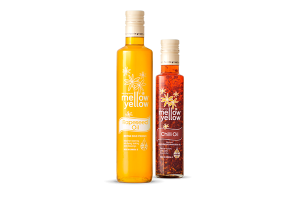 Oils
Oils Rapeseed Oil
Rapeseed Oil Chili Oil
Chili Oil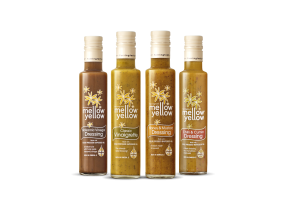 Dressings
Dressings Classic Vinaigrette
Classic Vinaigrette Balsamic Dressing
Balsamic Dressing Honey & Mustard
Honey & Mustard Chili & Cumin
Chili & Cumin